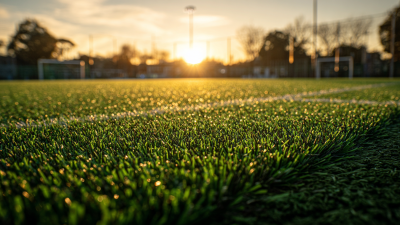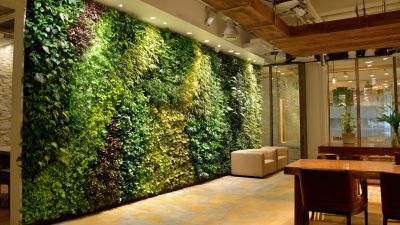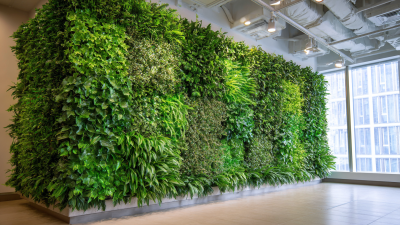As urbanization continues to reshape our landscapes, homeowners and designers are increasingly turning to innovative solutions to create lush outdoor spaces that reflect a sense of nature while maintaining practicality. Outdoor artificial grass has emerged as a popular alternative to traditional grass, with a recent report from the Synthetic Turf Council indicating that the market for artificial turf is projected to grow at a CAGR of 10% through 2025. This growth can be attributed to its low maintenance, water-saving benefits, and aesthetic appeal, making it an ideal choice for environmentally conscious consumers.

Moreover, a study by the National Association of Realtors found that landscaping significantly affects property value, with well-maintained outdoor spaces yielding a 14% increase in home value. As more people seek to enhance their outdoor environments with sustainable yet beautiful materials, outdoor artificial grass offers a viable solution with diverse applications, from residential lawns to commercial landscapes.
Artificial grass has emerged as a transformative element for outdoor design, offering numerous benefits that contribute to lush, sustainable spaces. According to a study conducted by the Synthetic Turf Council, the use of artificial turf can reduce water consumption by up to 60%, making it an ideal choice for eco-conscious homeowners and businesses alike. This innovation not only conserves water but also minimizes the need for fertilizers and pesticides, leading to a healthier environment. Furthermore, the life expectancy of artificial grass is around 15-20 years, which means long-term savings on maintenance and replacement costs.
Tips: When selecting artificial grass, consider choosing products with a UV stability rating to ensure color retention and durability against sunlight. Additionally, it's essential to invest in a high-quality infill material to enhance drainage and provide a natural feel underfoot.
Incorporating artificial grass into outdoor spaces also promotes versatility in design. From residential backyards to commercial rooftops and parks, the product can be customized to suit various aesthetics and functional requirements. Homeowners can create engaging spaces for leisure activities without the constant worry of mud and dirt. A report by IBISWorld indicates that the artificial turf market is projected to grow by 7.5% annually, reinforcing its increasing popularity in innovative outdoor design.
| Dimension | Details |
|---|---|
| Durability | Lasts 15-25 years with proper maintenance |
| Maintenance | Minimal upkeep, no mowing required |
| Aesthetic Appeal | Looks lush and green all year round |
| Environmental Impact | Reduces water usage, eco-friendly materials |
| Comfort | Safe for children and pets, non-toxic |
| Versatility | Suitable for various applications: lawns, rooftops, playgrounds |
| Cost-Effectiveness | Lower long-term costs compared to natural grass |
Transforming small backyards into lush outdoor spaces can be a fun and rewarding project, especially with the use of artificial grass. One creative idea is to create defined zones within your limited space. By using artificial grass to delineate areas for relaxation, play, or gardening, you can maximize functionality without sacrificing style. For instance, a small patch of vibrant green grass can serve as a cozy nook for a bistro set, making it an inviting place for morning coffee or evening gatherings.
Another innovative approach is to incorporate multi-level designs. By adding small terraces or raised planters lined with artificial grass, you can add depth and interest to your backyard. This not only creates an attractive visual element but also provides opportunities for vertical gardening. Adding decorative stones or pavers in conjunction with the grass can further enhance the aesthetic, creating a sophisticated and cohesive look. Such designs can help make the most of limited space, ensuring that your small outdoor area remains both functional and visually appealing.

Creating lush outdoor spaces can be both beautiful and environmentally sustainable by incorporating eco-friendly grass alternatives. With the global lawn and garden consumables market projected to increase from USD 22.92 billion in 2024 to approximately USD 41.13 billion by 2034, the demand for sustainable landscaping solutions is on the rise. Homeowners are increasingly seeking alternatives to traditional grass that require less water and maintenance while still providing a vibrant aesthetic.
One of the most innovative solutions is the use of artificial grass, which offers a lush, green appearance without the environmental cost of excessive water usage and chemical fertilizers. Tips for maintaining an eco-friendly landscape include incorporating native plants and xeriscaping techniques, which can significantly reduce water consumption. Additionally, instead of solely relying on traditional grass, consider blending clover or other ground covers into your yard, providing a natural habitat for pollinators while minimizing the need for lawn care.
As environmental sustainability becomes a priority for many, adopting these innovative landscaping ideas can enhance outdoor spaces while contributing to a healthier planet. With 60% of Americans valuing environmental sustainability in their lawn care practices, it’s clear that there is a shift toward greener, smarter outdoor solutions.
This bar chart illustrates the increasing adoption rates of eco-friendly grass in landscaping projects from 2020 to 2023, showcasing a significant trend towards sustainable outdoor spaces.
When it comes to creating safe and engaging play areas for kids and pets, incorporating artificial grass can be a transformative solution. Studies indicate that nearly 60% of pet owners regret choosing traditional grass due to maintenance challenges and the risk of pests. Artificial grass not only addresses these concerns but also provides a soft, durable surface that is easy to clean and allergy-friendly. Moreover, it drains efficiently, reducing the likelihood of muddy paws and messes after rain, making it ideal for households with active pets and children.
Tip: When selecting artificial grass, ensure it is non-toxic and free of harmful chemicals to keep your children and pets safe while playing outside. Look for products that have been certified for safety standards, and consider grass options that feature UV protection to maintain vibrant color and longevity.
Another advantage of artificial grass is its versatility in design. Homeowners can create themed play zones for their children or designated areas for their pets. Incorporating natural elements such as wood chips or decomposed granite alongside synthetic turf can enhance the aesthetic appeal while providing a functional environment. This combination allows you to create a grassless yard that is not only dog-friendly but also an inviting space for family gatherings and outdoor fun.
Tip: To maximize your outdoor space, think about implementing features like agility courses for pets or sandbox areas for kids. These additions can encourage active play and ensure everyone enjoys a stimulating outdoor experience.
Creating elegant patios and walkways with artificial grass can transform ordinary outdoor spaces into stunning, lush environments. By integrating artificial grass elements into your design, you not only enhance the aesthetic appeal but also gain practical benefits. The versatility of artificial grass allows for unique patterns and textures, enabling homeowners to craft visually striking pathways that contrast beautifully with hard surfaces like stone or concrete. These grass elements can be incorporated as borders, insets, or even as central features, providing a vibrant green contrast that brightens the entire area.

Additionally, the maintenance-free nature of artificial grass makes it an ideal choice for outdoor spaces. Unlike traditional grass, it requires no mowing, watering, or fertilizers, allowing homeowners to enjoy their patio and walkway without the hassle of upkeep. This not only saves time but also promotes sustainability, as artificial grass conserves water and reduces the need for chemicals. For a truly elegant outdoor space, consider using artificial grass to frame a serene seating area or to connect different sections of your garden with soft, inviting pathways that encourage relaxation and enjoyment.












